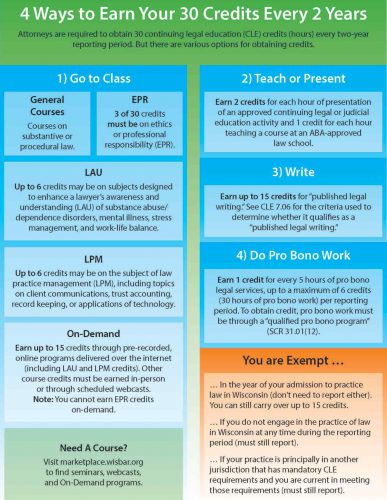
An attorney finds themselves in a precarious position. They’ve waited until the very last minute to complete their required CLE. Now they’re attempting to earn 24 hours of CLE credit, but they only have 36 hours left.
It’s stressful and disruptive.
It’s also completely unnecessary. If you’re focused on CLE best practices and you have a framework to follow, your CLE requirements should be a breeze.
Why do attorneys wait until the last minute?
They obviously know better.
Yet practicing attorneys continue to scramble at the end of their registration period. Are most attorneys inefficient, lazy or clueless?
Not at all.
The vast majority of attorneys procrastinate because they’re overwhelmed. They’re struggling to meet the vast array of demands placed on them:
- Business demands: Owners of small firms are fighting a never-ending battle to keep the lights on and their doors open. Circumstance requires that they wear multiple hats. Many are exhausted, burned out and fighting to keep their firm afloat.
- Partner/firm expectations: Attorneys are expected to produce a certain amount (hours) of billable work. Year after year, that number continues to rise. To complicate matters further, many are expected to become rainmakers as well.
- Client demands: Clients are fixated on value and outcomes. The demanding clients of today expect a significant amount of communication from the attorneys handling their matter. They expect more work in less time and for less money.
- Familial expectations: There’s a price to pay for going above and beyond. Performing well at work often means underperforming at home. Many attorneys find it hard to balance the personal and professional demands placed on them.
- The deluge of non-billables: Attorneys are spending 6+ hours per day on non-billable work. They’re buried under administrative, document management, timekeeping and business development tasks.
Here’s the problem.
Pundits outline a list of best practices attorneys should follow. These are excellent tips, but they lack context and a keen understanding of the challenges attorneys face today.
Let’s take a look –
- Don’t procrastinate. Don’t wait until the end of your registration period to complete your CLE. Compliance periods range from one to three years, depending on your jurisdiction. Complete your courses year-round so you won’t have to cram 24 credits into a 36-hour time frame.
- Don’t pass the time. It’s a bad idea to optimize courses around credits. Don’t take CLE courses unless you’re actually interested in them. Your objective is becoming a better attorney, not passing the time.
- Track your credits. Lawline offers a free CLE tracker you can use with any state requirement, any provider and any course format. You can also download CLE worksheets to track your time. Take the time to ensure you receive credit for your hard work.
- Stay engaged. Don’t disengage from the process. If you’ve procrastinated and you’re scrambling to complete your CLE, stay engaged in the process. Don’t cheat yourself by tuning out, listening passively or disengaging from the course material. Stay focused and your learning will compound, giving you the advantage you need to surpass your peers.
- Remember specialty credits. Most states require some sort of specialty credits (e.g. ethics, mental health, diversity and inclusion or professionalism). You want to check the requirements for your state, ensuring that you have the specialty credits you need.
Here’s the problem with these best practices.
They lack perspective.
Life is messy, especially when combined with the bevy of business, partner, client, familial and non-billable demands placed on attorneys. These best practices are good habits you should do your best to follow.
They’re that important.
But they’re also not the best way to optimize your learning.
What does that mean?
It’s common for attorneys to view CLE requirements as a burden, an unnecessary load that they are forced to carry. In reality, these CLE requirements are a privilege.
That sounds strange, doesn’t it?
Think about that for a moment. A governing body requires that you continue your education. That you do what it takes to become a better attorney. This isn’t the way it works for most other industries. They tend to follow a Darwinian approach instead.
Survival of the fittest.
Firms with a competitive advantage, strong value proposition and superior marketing skills, outperform their competitors. If you’re better, you survive.
The legal industry is different.
CLE requirements are proof of that. You’re required to grow, to maintain a certain standard of competence and expertise. The reason? Your performance reflects on the industry as a whole.
CLE boosts attorney performance
When it’s used appropriately, CLE does double duty, creating leverage and opportunity. When it comes to CLEs, there are two basic perspectives.
- CLE is something you receive in the form of in-person, on-demand or live training and courses. These courses cover a variety of general and special topics including ethics, professional responsibility, substantive or procedural law, communication, accounting, and record-keeping, among others.
- CLE is something you do/give. You speak, teach, present and write – contributing substantially to the continuing legal education of other attorneys. In select jurisdictions, you’re also able to earn CLE credit via pro bono work on behalf of indigent clients through qualified pro bono programs.
Here’s an example:

Most attorneys focus on one or the other which, at first glance, makes sense. What if there was a better way? Here’s how you can use giving and receiving to maximize the leverage and value you receive from your CLE.
- Receiving education: Attending live and in-person events where you’re able to learn from experienced attorneys and legal professionals from approved/accredited institutions. You’re able to reach out to speakers, teachers and presenters, asking questions, exploring ideas and nurturing your expertise.
- Giving education: Certain jurisdictions allow you to earn CLE credits by speaking and teaching in a variety of accredited institutions. You can speak and/or teach a CLE course via an accredited teaching center, law school, university, college or community college.
Here’s where this gets exciting.
Giving and receiving creates enormous leverage. With the right framework and a clear plan to follow, you can create a new set of best practices. A kind of compounding value that continues to grow with time.
Here’s what I mean.
Let’s say you need to earn 30 CLE credits every two years. You use receiving and giving as a strategy to maximize leverage.
- Receiving education: You choose to attend live, in-person and on-demand courses on a variety of topics. You carefully choose an accredited provider (e.g. an approved organization, law school, university or college).
- Giving education: You reach out to your preferred, accredited provider ahead of time and you pitch original content you’ve created specifically for attorneys. It contributes substantially to the continuing legal education of other attorneys, and it provides a tremendous amount of value.
- You give and receive at the same event. You focus your attention on learning and growing. You do the same for other attorneys. You reap the benefits and rewards in the process.
See it?
The benefits and rewards I mentioned earlier?
No?
Let’s take a look.
- More CLE credits, faster. Your willingness to give and receive education means you’re able to earn more CLE credits faster and in less time.
- Instant authority. As a teacher, speaker or presenter, you’ve created a significant amount of value. Provide students, attorneys and legal professionals with value, and you build authority automatically. You’re consistent, so you’ve become a sought after thought leader and influencer.
- Profitable relationships via networking. Teaching, speaking and writing has, over time, turned you into a super connector. Your willingness to give enables you to rapidly build relationships with powerful influencers, administrators, gatekeepers and kingmakers in other firms. You continue to serve key relationships with information, connections and helpful referrals.
- Valuable information. If you’re successful in your role as a speaker, teacher or writer, your audience will want to share their stories. You learn about what other firms are doing, how clients are responding, and important trends sweeping across your industry. But the most important part? You’ll receive this information first, before your firm, your peers and your competitors. If you have access to valuable information no one else has, you’re more valuable to your firm, clients and coworkers.
- Rainmaking naturally. Attorneys, like clients, are naturally drawn to authoritative influencers and thought leaders. Attorney referrals are easier to come by when your connections are built on a foundation of education. Education attracts attention, information converts that attention to value (e.g. referrals, consults and revenue).
- More career opportunities. Whether you’re a partner or associate at your firm, this strengthens your negotiating position. You have a large Rolodex of connections, resources, and you’re able to bring in a steady supply of referral and new client business. You also have access to a steady stream of top-shelf, A player talent. Losing ‘you‘ could be a costly proposition for your firm. These strategies provide you with the tools you need to negotiate an above-average salary, benefits and/or incentives.
See what I mean?
There’s an incredible amount of value here. How do you maximize the value you receive from your CLE? With more best practices.
- Use structured procrastination. John Perry won the Nobel Prize for his theory of structured procrastination. Here’s how it works. You use procrastination to accomplish a long list of to-dos. These tasks are used to avoid the work you’re supposed to be doing. It sounds crazy, but it works. Struggling to make headway on a client matter? Use your CLE to earn credits, create value, build connections and attract referrals.
- Double your CLE requirements. Does your state require 30 hours of CLE? Do 60. Some states allow you to roll a certain number of credits over into the next compliance. That’s icing on the cake. Instead, treat your CLE as a business development strategy. Use it to build a network of information, connections and Look for ways to serve your peers. Then parlay your experience, connections and referrals into a bigger opportunity. Use it to attract a steady stream of prospective clients.
- Avoid as many courses as you can. Specialize in a specific topic or practice area. This will enable you to maximize the benefits you receive while minimizing the output required. Create presentations, make speeches and write articles on the topic or practice area of your choice. Take mandatory courses, but avoid as many unappealing courses as you can.
- Make specialty credits better. As I mentioned earlier, most states require some sort of specialty credits (e.g. ethics, mental health, diversity and inclusion or professionalism). If it’s within your area of expertise or you have an interest, make these courses better. Become the go-to professional your peers count on to provide value in these areas.
This is great and all.
Just one problem. You don’t have the time to make any of this happen.
Am I right?
It’s a common (and understandable) retort to the CLE problem.
The good news?
There are lots of ways around this problem. Here are a few ways to take advantage of the best practices I mentioned earlier and maximize the benefits you receive from your CLE.
- Use Automation: If you’re the owner of a solo or small practice you can use automation to regain as much as six to eight hours per day! Law firm partners and associates can also use automation to regain lost time.
- Create marketing systems and workflows. Partners, solo and small firm owners can use this comprehensive guide to create marketing and client intake workflows. Solo and small firm owners can also use this to create a variety of systems and procedures for their firm.
- Use practice management software to minimize the amount of time spent (wasted) non-billable work (e.g. administrative and business development work. Your practice management tools should also include timekeeping, task, document, and project management tools.
These tools and resources enable attorneys to reduce/automate the business, partner, firm and client expectations placed on attorneys. It also minimizes the deluge of non-billable work attorneys struggle with on a daily basis.
It’s an easy ways to free up 6 to 8 hours in your workday.
It starts with CLE best practices
These CLE best practices are simple and straightforward. Use them to maximize the amount of value you’re able to extract from your CLE resources.
Don’t wait.
Many attorneys find themselves in this position. The position where they’re attempting to earn 24 hours of CLE credit but they only have 36 hours left.
It’s completely unnecessary.
Your CLE can (and should) do double duty. You can squeeze an enormous amount of additional value from your continuing education. Treat your CLE as the blessing it is.
Most attorneys view it as a tedious affair that takes them away from important work. You have an opportunity to see CLEs for what they really are.
An opportunity.
Use the strategies and tactics I’ve shared to maximize the leverage, value and revenue you receive. If you’re focused on best practices you have a framework to follow. Follow it and you’ll find your CLE produces value inside and outside the classroom.





